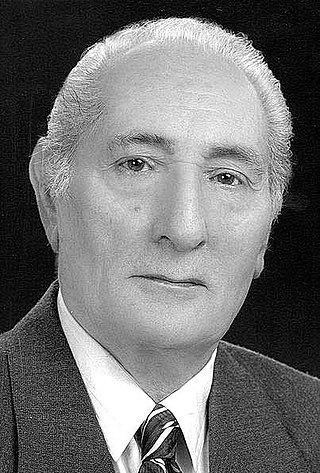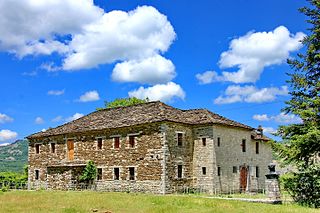
Khājeh Shams-od-Dīn Moḥammad Ḥāfeẓ-e Shīrāzī, known by his pen name Hafez or Hafiz, was a Persian lyric poet whose collected works are regarded by many Iranians as one of the highest pinnacles of Persian literature. His works are often found in the homes of Persian speakers, who learn his poems by heart and use them as everyday proverbs and sayings. His life and poems have become the subjects of much analysis, commentary, and interpretation, influencing post-14th century Persian writing more than any other Persian author.

Naim bey Frashëri, more commonly Naim Frashëri, was an Albanian historian, journalist, poet, rilindas and translator who was proclaimed as the national poet of Albania. He is regarded as a pioneer of modern Albanian literature and one of the most influential Albanian cultural icons of the 19th century.

The Academy of Persian Language and Literature (APLL) is the regulatory body for the Persian language, headquartered in Tehran, Iran. Formerly known as the Academy of Iran, it was founded on May 20, 1935, by the initiative of Reza Shah, the founder of Pahlavi dynasty. The academy acts as the official authority on the language, and contributes to linguistic research on Persian and other languages of Iran.

Persian literature comprises oral compositions and written texts in the Persian language and is one of the world's oldest literatures. It spans over two-and-a-half millennia. Its sources have been within Greater Iran including present-day Iran, Iraq, Afghanistan, the Caucasus, and Turkey, regions of Central Asia, South Asia and the Balkans where the Persian language has historically been either the native or official language.

A Persianate society is a society that is based on or strongly influenced by the Persian language, culture, literature, art and/or identity.
Albanian literature stretches back to the Middle Ages and comprises those literary texts and works written in Albanian. It may also refer to literature written by Albanians in Albania, Kosovo and the Albanian diaspora particularly in Italy. Albanian occupies an independent branch within the Indo-European family and does not have any other closely related language. The origin of Albanian is not entirely known, but it may be a successor of the ancient Illyrian language.
Hossein Mohyeddin Ghomshei is an Iranian scholar, philosopher, author, and lecturer on literature, art, and mysticism.
The influence of Persian literature in Western culture is historically significant. In order to avoid what E.G. Browne calls "an altogether inadequate judgment of the intellectual activity of that ingenious and talented people" (E.G.Browne, p4), many centers of academia throughout the world today from Berlin to Japan have permanent programs for Persian studies for the literary heritage of Persia.

Iranian studies, also referred to as Iranology and Iranistics, is an interdisciplinary field dealing with the research and study of the civilization, history, literature, art and culture of Iranian peoples. It is a part of the wider field of Oriental studies.

Abu Mohammad Moshrefoldin Mosleh ebn Abdollah ebn Mosharraf, better known by his pen name Saadi, also known as Saadi of Shiraz, was a Persian poet and prose writer of the medieval period. He is recognized for the quality of his writings and for the depth of his social and moral thoughts.

Sami bey Frashëri or Şemseddin Sâmi was an Albanian writer, lexicographer, philosopher, playwright and a prominent figure of the Rilindja Kombëtare, the National Renaissance movement of Albania, together with his two brothers Abdyl and Naim. He also supported Turkish nationalism against its Ottoman counterpart, along with secularism against theocracy.

Ghadam-Ali Sarami is an Iranian author and poet. He was born in Ramhormoz, a small town in Khuzestan Province, southwest of Iran. In 1986, he received a Ph.D. in Persian language and literature from University of Tehran, Iran. He is an associate professor of Persian language and literature at University of Zanjan and an expert in Ferdowsi's Shahnameh, Tarikh-i Bayhaqi, and Hafez, Sa'di, Rumi, and other masters of Persian literature and poetry.

Mohammad-Amin Riahi was a prominent Iranian literary scholar of Persian literature, a historian, writer and statesman. Apart from being one of the authors of Dehkhoda Dictionary and Encyclopædia Iranica, he was the author and editor of several well-known scholarly books. Mohammad-Amin Riahi received his PHD on Persian literature from Tehran University under the supervision of Badiozzaman Forouzanfar. Riahi is best known for his scholarly works on Shahnameh and Ferdowsi, Hafiz, and the ancient iranian languages. He has produced critical editions of some of the major classical Persian texts such as Mersad-al-ebad and Nozhat-al-majalis. During a course of 60 years he published numerous scholarly articles, a selection of which are gathered in a volume titled Forty essays on language, literature and history of Iran.
Drago Siliqi was an Albanian poet, literary critic, and publisher. At the age of 14 he became a scout and then a partisan of the National Liberation Movement. He published his first collection of poetry, and then pursued university studies at the Maxim Gorky Literature Institute in Moscow.

Ahmed Sudi, also known as Sudi-yi Bosnawi, was a 16th-century Bosnian commentator under the Ottoman Empire. He was the author of several Ottoman Turkish commentaries on Persian classics such as the Masnavi of Rumi, the Gulistan and Bostan of Saadi Shirazi, and The Divān of Hafez. According to Professor of Persian and Islamic studies Hamid Algar, Sudi is "perhaps the most prominent of all Ottoman Persianists".

Nasibi Tahir Babai, born Tahir Skënderasi, was an Albanian Bektashi wali and bejtexhi.
Shahin Frashëri was an Albanian bejtexhi of the 19th century. His Mukhtarnameh poem is one of the longest and earliest epics in Albanian literature.

The village of Frashër in southern Albania saw the emergence of several notable families in the history of Albania. They contributed to the independence of Albania throughout military actions but also in literature and politics. The most notable of these families are the family to which belonged Naim Frashëri, national poet of Albania.

















